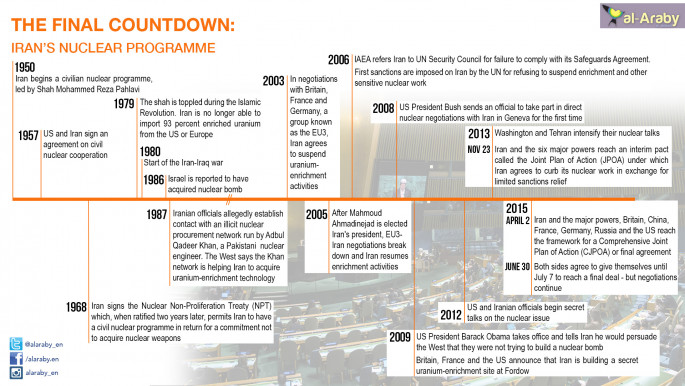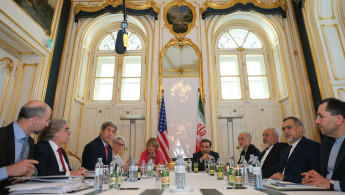Iran: A promising market for French companies
If the Vienna negotiations on the Iranian nuclear deal are concluded satisfactorily, the ensuing détente will sharpen the appetites of foreign companies anticipating the lifting of sanctions.
French firms are in a strong position to benefit, even though they run the risk of being hampered by Paris' rigid stance towards the negotiations.
France is better placed than most to meet Iran's investment needs.
It fulfils all the criteria necessary to cater to the country's economic and technical cooperation requirements, given its historically stable political relations, investment potential and plenty of goodwill. But when the floodgates are opened, these assets will not be enough to give it the role it deserves unless the government takes the initiative.
High potential
Many international economists expect that a definitive agreement on the nuclear issue could boost Iran's economic growth by as much as five percent in the first year (GDP stands at around €380bn/$420bn).
According to Ramin Rabii, CEO of Turquoise Partners - the leading financial services firm in Tehran for foreign investors - this increase could rise to more than seven percent over the following 18 months, a rate comparable to those enjoyed by the "Asian Tiger" economies at the height of their economic boom.
At the moment, Iranian industry operates at a little over 60 percent of capacity, according to analysts. Meanwhile, trade between Iran and the European Union, which accounted for €7.6bn ($8.4bn) in 2014, could be multiplied fivefold by mid-2018, according to some projections.
International sanctions have pushed Iranian companies to expand their capabilities and to develop specialised skills in order to meet demand with serious expertise.
There is a whole body of indigenous engineers and other technicians who could be employed by specialist foreign investors in various fields.
According to Renaud Carvalho, managing partner at SPTEC Advisory, a Paris-based oil and gas consultancy, everything for business is in place in Iran, well structured and relatively well organised. The tools are available on site, so it is not necessary to import them, and the staff is operational.
| Trade between Iran and the EUnion, which accounted for €7.6bn in 2014, could be multiplied fivefold by mid-2018 |
Nevertheless, Iranians are seeking foreign expertise to modernise their ageing infrastructure - which the long-term sanctions regime has threatened to render obsolescent.
For example, much of the gas production is reinjected into oil wells, which need to be stimulated to maintain the level of production, especially if they are old.
Obstacles to trade
The ownership structure of Iranian companies has also evolved.
Public and semi-public authorities, notably the Iranian Revolutionary Guards Corps, have strengthened their presence in the economy. Although these entities are often penalised and blacklisted - sometimes through a personal capacity - it will be difficult during the transitional period to easily identify the shareholding activity of future Iranian partners or subcontractors.
Similarly, most large companies investing in Iran are facing difficulties due to the high turnover of managers on site.
The diversity of legal sources behind the trade restrictions placed on Iran - with various blacklisted entities and individuals - complicates the lifting of sanctions and its aftermath.
The influence of the US Treasury further impedes companies' ability to assess the situation before they can return to the Iranian market. Beyond legal debates, companies need to wait and see how relations between Iranian and international banks unravel before reinvesting in Iran.
How the banks respond to any new agreement with Iran is sure to be an important factor in how the country emerges from under the weight of sanctions.
The current restrictions affect the banking sector primarily, not least because most international institutions have been reluctant to process transactions involving Iran, due to the principle of extraterritoriality of US law and the pressure brought to bear by the US Treasury.
As a result, the market has become virtually impenetrable.
But although Iran is now excluded from the international banking system, many analysts believe that Washington could allow foreign banks to enter into transactions with the country without fear of punishment in the US.
According to Mehrdad Emadi, an economist at the London-based firm Betamatrix, Iran could also be reinstated in the international SWIFT payment system, from which it was excluded in 2012, within three months of a final agreement.
| Article continues below | |
 |
Oil and other markets
Iran has 200 years of guaranteed oil reserves at current rates of production. It has the fourth-largest proven oil reserves in the world (ten percent of the total known) and the largest reserves of gas - nearly 18 percent of the world's known reserves.
But its oil exports have fallen from 2.5 million barrels per day (bpd) in 2012 to about 1.1mbpd today, not least because of the EU ban on the import of Iranian crude since 1 July 2012.
Iran has the necessary equipment and staff to bring its production back up to pre-sanctions levels, but it will reportedly need to spend nearly $250bn on infrastructure - $150bn on exploration/production - to do so. It also has extensive downstream production facilities. The major production centres are well served by export terminals.
A big factor in its favour is that, on average, Iranian crude only costs $25 a barrel to produce.
By comparison, in Angola, whose increased production has largely compensated for Iran's absence from the world market, the average production cost is $50 per barrel - while in Alaska the figure is around $100.
Also more expensive to extract are the heavy oils produced by Venezuelan and Canadian shale oil, which has struggled to maintain its profitability as global oil prices have fallen, leaving countries such Iran in a very strong position.
While high royalties, in some cases as much as 90 percent, might deter some investment in the sector, companies such as Total or Engie (as GDF Suez is now called) are expected to make a quick return to previously held ground in Iran's energy sector.
But it is specialist areas such as waste management and decontamination where French companies like Veolia - formerly Vivendi - and Suez Environnement - recently spun off from GDF Suez - are believed to have the edge in expertise.
And Iran has certainly fallen behind in environmental policy and sustainable development. Of the ten most polluted cities in the world, three are in Iran.
Ahvaz ranks first, mainly because its air remains contaminated with sulphide gas and chemical dust from the Iran-Iraq war. While the country's regulatory framework remains weak, few doubt that international sanctions have taken their toll in this area, with limitations on trade hindering the development of related advanced technologies.
| Of the ten most polluted cities in the world, three are in Iran |
Iran's vice-president, Masoumeh Ebtekar, is also the head of its Environmental Protection Organisation.
During a visit to France in February 2015, Ebtekar told an audience of potential investors that the country was anxious to develop and diversify the country's clean energy supply.
She mentioned several options, including solar, wind and hydroelectric. The target, she said, was 10,000MW of annual clean energy production capacity by 2020.
Water supply is another area of potential French investment.
A 2013 study by the World Resources Institute ranked Iran as the 24th most water-stressed country in the world. The country is now paying a high price for bad water management policies in the past, Ebtekar said.
The damage done to the country's ecosystem is starkly illustrated by the shrinking of Lake Urmia, the country's largest lake, as well as the drying-up of the Lake Hamoun wetlands area in the south east.
French companies have suffered heavily from the sanctions on Iran.
Long-standing commercial relationships in the oil and automotive industries were broken in tandem with political and cultural ties when France pre-emptively withdrew from the Iranian market.
Until 2011, Peugeot/Citroën and Renault shared 40 percent of Iran's automobile market; Iran was Peugeot's second-biggest market.
The two companies' departure is understood to have cost them the sale of some 600,000 vehicles. Renault accrued a loss of €512m.
With French manufacturers excluded, Asian companies enhanced their presence. Sales of Chinese vehicles had reportedly almost tripled by the first quarter of 2014, albeit with the overall volume of sales relatively low.
But Vice-President Ebtekar reminded her audience of the potential benefits of French branding in the Iranian public consciousness. By contrast there appears to be some public dissatisfaction at the quality of Chinese technology, which is often chosen by default.
A version of this article was previously published in French by our partners at Orient XXI.



